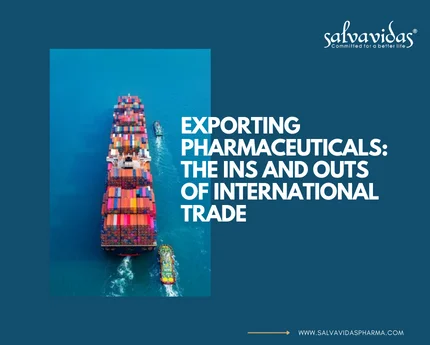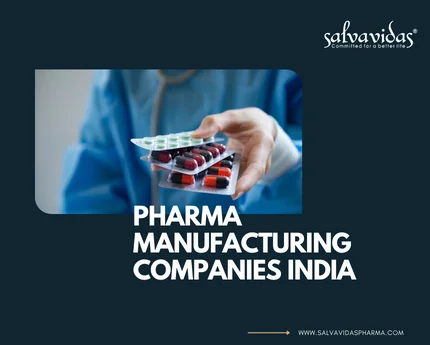
If you’re in the pharmaceutical industry and looking to expand your business globally, then exporting pharmaceuticals is the way to go. However, like any other industry, the world of international trade comes with its own set of challenges and considerations. In this article, we’ll explore the ins and outs of exporting pharmaceuticals, and provide you with the essential information you need to know. Introduction The pharmaceutical industry is a vital part of the global economy, with an estimated worth of over $1.3 trillion in 2021. It’s no wonder that more and more companies are looking to expand their operations and reach new markets by exporting pharmaceuticals. However, the process of exporting pharmaceuticals is complex, and there are a number of regulations and considerations that need to be taken into account. In this article, we’ll provide an overview of the ins and outs of exporting pharmaceuticals, from the regulatory landscape to the logistics of shipping. Regulatory Landscape Exporting pharmaceuticals requires compliance with a range of regulations at the local, national, and international levels. Some of the key considerations include: Regulatory approvals: Before exporting pharmaceuticals, it’s essential to obtain the necessary regulatory approvals from the destination country. This typically involves obtaining a product license, which can take several months to process. Quality control: To ensure that pharmaceutical products meet the required quality standards, they need to be manufactured in accordance with Good Manufacturing Practice (GMP) guidelines. These guidelines outline the minimum standards for the production, testing, and release of pharmaceutical products. Intellectual property: Protecting intellectual property rights is essential when exporting pharmaceuticals. This includes registering patents, trademarks, and copyrights, and ensuring that your products do not infringe on the intellectual property of others. Data protection: Pharmaceuticals typically contain sensitive information, and it’s important to ensure that this information is protected when exporting products. This involves compliance with data protection regulations, such as the General Data Protection Regulation (GDPR) in the EU. Logistics of Exporting Pharmaceuticals In addition to regulatory considerations, there are a number of logistical challenges to overcome when exporting pharmaceuticals. Some of the key considerations include: Temperature control: Pharmaceuticals are often temperature-sensitive and need to be transported and stored at specific temperatures to maintain their efficacy. This requires careful planning and coordination to ensure that products are not exposed to temperatures that could compromise their quality. Packaging and labeling: Pharmaceutical products need to be packaged and labeled in accordance with local regulations. This typically involves using tamper-evident packaging and including specific information on the label, such as the name of the product, the dosage, and the expiration date. Shipping and customs: Exporting pharmaceuticals involves navigating a complex web of shipping and customs regulations. This includes obtaining the necessary permits and licenses, ensuring that products are correctly classified for customs purposes, and paying the relevant duties and taxes. The global pharmaceutical industry is a rapidly growing market, worth hundreds of billions of dollars. As the demand for pharmaceuticals continues to rise, many companies are looking to expand their operations by exporting their products to other countries. However, exporting pharmaceuticals can be a complex and challenging process, with a number of rules and regulations that must be followed. In this article, we will explore the ins and outs of exporting pharmaceuticals and provide you with the information you need to get started. Understanding the Global Market for Pharmaceuticals The global market for pharmaceuticals is a highly competitive and lucrative industry. With the rise of new technologies and the increasing demand for new and innovative medicines, many companies are looking to expand their operations by exporting their products to other countries. However, before you can start exporting, it is important to understand the global market and the regulations that govern it. The Regulations and Requirements for Exporting Pharmaceuticals Exporting pharmaceuticals is a regulated industry, with a number of rules and regulations that must be followed. Some of the most important regulations include: Good Manufacturing Practices (GMP) Good Manufacturing Practices (GMP) are a set of guidelines that must be followed by companies in order to ensure the quality and safety of their products. These guidelines cover everything from the manufacturing process to the storage and transport of products. Companies that are exporting pharmaceuticals must be able to demonstrate that they are following GMP in order to be approved for export. Licensing and Certification In order to export pharmaceuticals, companies must be licensed and certified by the relevant authorities. This includes obtaining a license to manufacture pharmaceuticals and obtaining certification for the products being exported. Companies must also comply with the regulations of the countries to which they are exporting, which may include additional licensing and certification requirements. Labelling and Packaging Requirements Labeling and packaging requirements are important parts of exporting pharmaceuticals. Companies must ensure that their products are labeled and packaged in accordance with the regulations of the country to which they are exporting. This includes providing information about the product, such as its composition and how it should be used, as well as any warnings or precautions that may be required. Preparing to Export Pharmaceuticals Once you have a clear understanding of the regulations and requirements for exporting pharmaceuticals, it is time to start preparing for your export operations. Some of the key steps in preparing to export pharmaceuticals include: Market Research Before you start exporting, it is important to conduct market research in order to identify the countries that are most likely to be interested in your products. This research will help you to understand the demand for your products, as well as the competition and regulatory requirements in each market. Building Relationships with Customers and Suppliers In order to succeed in the global market, it is important to build strong relationships with your customers and suppliers. This may involve working with local distributors or agents who can help you to reach potential customers and comply with local regulations. Establishing a Quality Management System Establishing a quality management system is essential for exporting pharmaceuticals. This system should include processes for ensuring

Introduction Explanation of the importance of the pharmaceutical industry in India: The pharmaceutical industry is an essential component of modern healthcare systems, playing a crucial role in the development and distribution of life-saving drugs. India has established itself as a major player in the global pharmaceutical landscape, with a vast array of pharmaceutical manufacturing companies that cater to local and international markets. Overview of the topic: top pharma manufacturing companies in India: In this blog post, we will take an in-depth look at the top pharma manufacturing companies in India, exploring their products, services, and market presence. Our aim is to provide a comprehensive overview of the industry and its key players, to help you better understand the dynamics of this vital sector. Overview of the Pharmaceutical Industry in India Historical background: The pharmaceutical industry in India has a long and rich history, with roots that date back to the early 1900s. In the decades since, the industry has grown and evolved, establishing itself as a leading player in the global pharmaceutical landscape. Today, India is home to a diverse range of pharmaceutical manufacturing companies, producing a wide range of generic and branded drugs for local and international markets. The current state of the industry: The current state of the pharmaceutical industry in India is one of growth and expansion. Despite facing challenges such as patent protection, regulatory compliance, and price control, the industry continues to thrive, driven by rising demand for affordable drugs, supportive government policies, and the development of new technologies. Future growth potential: The future growth potential for the pharmaceutical industry in India is substantial. With a growing population, rising income levels, and increasing access to healthcare, the demand for drugs is expected to continue growing, both domestically and abroad. Additionally, the government has implemented a number of initiatives aimed at supporting the growth of the pharmaceutical sector, such as tax incentives, investment in research and development, and streamlined regulatory processes. With these factors in mind, it is clear that the pharmaceutical industry in India has a bright future ahead of it. Product Offerings of Pharma Manufacturing Companies in India Overview of the types of products manufactured in India: The pharmaceutical manufacturing companies in India produce a wide range of products, including both generic and branded drugs. Some of the most common product types manufactured in India include prescription drugs, over-the-counter medications, dietary supplements, and medical devices Comparison of product portfolios of different companies: Comparing the product portfolios of different companies can be a useful way to understand the strengths and weaknesses of each company. For example, Company A may specialize in producing generic drugs, while Company B may have a strong portfolio of branded drugs. Additionally, some companies may focus on producing specific product types, such as oncology drugs or vaccines, while others may have a more diverse portfolio. Analysis of trends and future prospects for each product type: Examining the trends and future prospects for each product type can also provide valuable insight into the overall health of the pharmaceutical industry in India. For example, the demand for generic drugs is expected to continue growing in the coming years, driven by rising healthcare costs and increasing access to affordable drugs. On the other hand, the medical device market in India is expected to experience significant growth, driven by advances in technology and increasing demand for medical devices in the local market. Understanding these trends and prospects is crucial for anyone looking to invest in the Indian pharmaceutical landscape. Market Presence and Growth of Pharma Manufacturing Companies in India Overview of the Indian pharmaceutical market: The pharmaceutical industry in India is a vital and growing sector, with a rich history and a promising future. With a large number of pharmaceutical manufacturing companies operating in the country, the industry offers a diverse array of products, services, and market opportunities. Comparison of market share of top companies: In this blog post, we have explored the top pharma manufacturing companies in India, providing an overview of their products, services, and market presence. We have also discussed the current state and future prospects of the industry, highlighting key trends and challenges that are shaping its development. Analysis of future growth potential for each company: Whether you are a healthcare professional, an investor, or simply someone interested in the pharmaceutical landscape, this post provides valuable information on the Indian pharmaceutical industry. By understanding the key players and trends in this sector, you can gain a deeper understanding of this vital and growing industry. Conclusion Summary of key takeaways: The pharmaceutical industry in India is a complex and dynamic sector, with a rich history and a promising future. With a growing population, rising healthcare costs, and increasing access to affordable drugs, the Indian pharmaceutical landscape is vital and rapidly evolving landscape. Final thoughts on the pharmaceutical manufacturing industry in India: In this blog post, we have attempted to provide a comprehensive overview of the Indian pharma manufacturing industry, highlighting the key players, products, and trends that are shaping its development. Whether you are a healthcare professional, an investor, or simply someone interested in the industry, we hope that this post provides valuable information and insights. Recommendations for further research: We welcome your feedback and questions and invite you to continue exploring this complex and fascinating industry. By staying informed and engaged, you can gain a deeper understanding of the Indian pharmaceutical landscape and its impact on the world. If you looking for Pharma manufacturing companies in India – Salvavidas Pharmaceutical Manufacturing and Export companies in India. Contact Us: Name: salvavidas pharmaceutical pvt. ltd Email: info@salvavidaspharma.com Phone No: +91 98983 21242 Address: Corp. Office #803, Shubh Square, Near Lal Darwaja, Surat, Gujarat 395004, India

0